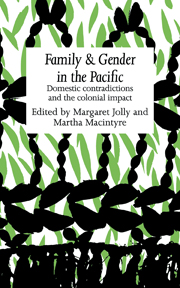Book contents
- Frontmatter
- Contents
- List of contributors
- Acknowledgements
- Map of main island groups of the Pacific
- Map of Papua New Guinea – Provinces
- Introduction
- 1 New England missionary wives, Hawaiian women and ‘The Cult of True Womanhood’
- 2 Changes in the lives of ordinary women in early post-contact Hawaii
- 3 Domestic structures and polyandry in the Marquesas Islands
- 4 The object lesson of a civilised, Christian home
- 5 Medical care and gender in Papua New Guinea
- 6 Suffer the children: Wesleyans in the D'Entrecasteaux
- 7 Women in contemporary Central Enga society, Papua New Guinea
- 8 Better homes and gardens
- 9 God, ghosts and people: Christianity and social organisation among Takuru Wiru
- 10 Sins of a mission: Christian life as Kwaio traditionalist ideology
- 11 Sacred spaces: churches, men's houses and households in South Pentecost, Vanuatu
- 12 Bond-slaves of Satan: Aboriginal women and the missionary dilemma
- Bibliography
- Index
7 - Women in contemporary Central Enga society, Papua New Guinea
Published online by Cambridge University Press: 05 November 2011
- Frontmatter
- Contents
- List of contributors
- Acknowledgements
- Map of main island groups of the Pacific
- Map of Papua New Guinea – Provinces
- Introduction
- 1 New England missionary wives, Hawaiian women and ‘The Cult of True Womanhood’
- 2 Changes in the lives of ordinary women in early post-contact Hawaii
- 3 Domestic structures and polyandry in the Marquesas Islands
- 4 The object lesson of a civilised, Christian home
- 5 Medical care and gender in Papua New Guinea
- 6 Suffer the children: Wesleyans in the D'Entrecasteaux
- 7 Women in contemporary Central Enga society, Papua New Guinea
- 8 Better homes and gardens
- 9 God, ghosts and people: Christianity and social organisation among Takuru Wiru
- 10 Sins of a mission: Christian life as Kwaio traditionalist ideology
- 11 Sacred spaces: churches, men's houses and households in South Pentecost, Vanuatu
- 12 Bond-slaves of Satan: Aboriginal women and the missionary dilemma
- Bibliography
- Index
Summary
It is now fifty years since the Central Enga first encountered Europeans and the exotic appurtenances of the industrial west. Their initial and sometimes sanguinary confrontations with small parties of itinerant prospectors were followed by intermittent but no less violent dealings with administration patrols in the late 1930s, and then by more prolonged and ambiguous commerce with paramilitary detachments of the Australian New Guinea Administrative Unit during World War II.
After 1946 the Australian Administration fixed itself more firmly in Enga territory and pushed the construction of patrol posts, roads and bridges. Then between 1947 and 1949 several Christian missions, Roman Catholic, Lutheran and Seventh Day Adventist, entered the area to establish their stations and to embark on a brisk competition for the souls of Enga.
All these alien entities, both sacred and secular, had overt and covert agenda to pursue that committed them to change Enga social institutions – economic, political, jural, religious. Subsequently the successors to the Australian colonial administration, in the form of bureaucratic agents of the independent State of Papua New Guinea, have continued the attempt to ‘develop’ the Enga and to induce them to participate gainfully in.the world economy. The latest approaches in this respect are embodied in Enga Yaaka Lasemana, the Enga Province Development Programme initiated with a handsome subvention from the World Bank (see Talyaga and Carrad 1981).
- Type
- Chapter
- Information
- Family and Gender in the PacificDomestic Contradictions and the Colonial Impact, pp. 135 - 155Publisher: Cambridge University PressPrint publication year: 1989
- 2
- Cited by



